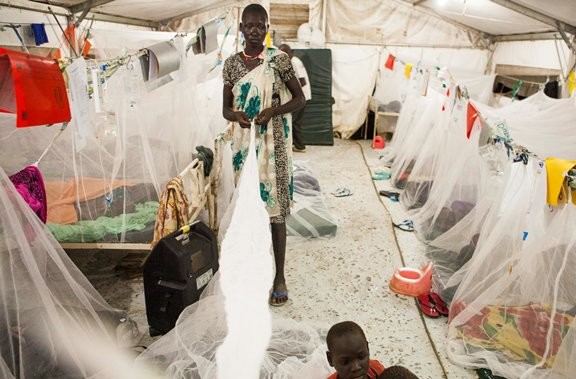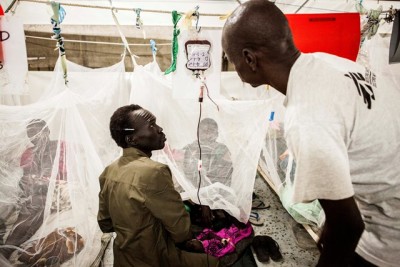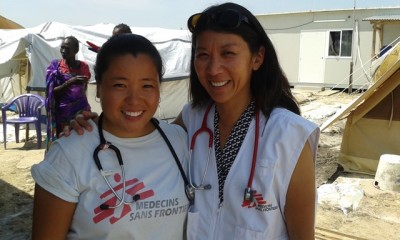
“Welcome to paradise!”
This is how I was greeted last September when I arrived at the Bentiu Protection of Civilians (PoC) Camp — a small, enclosed patch of land in South Sudan’s Unity State, where the United Nations is providing limited protection to more than 100,000 people who have been displaced by the brutal violence of the country’s ongoing civil conflict.
I had accepted a five-month assignment as an emergency nurse and department supervisorat the only hospital in the region, a facility inside the overcrowded Bentiu camp run by #Doctors Without Borders/Médecins Sans Frontières (#MSF). I consider myself a seasoned nurse, having worked five years as an ER nurse in Toronto and having undertaken several overseas assignments with MSF since 2013. I had already helped MSF deliver emergency care in Central African Republic, the Democratic Republic of Congo and Malakal, the site of another POC camp in South Sudan, as well as in Sierra Leone during last year’s Ebola outbreak. I knew that Bentiu would be a challenging assignment — but nothing could have prepared me for the heart-wrenching experience that was in store.

When I arrived, the rainy season was hitting the area full force. With the rains came the peak malaria season — and this particular malaria season was like none other anyone I spoke with had ever experienced. Our tent hospital was very quickly overwhelmed with severe cases. We had built a new extended emergency room, but it was soon inundated with between 200 and 300 patients a day. Most of them were children under five years of age, and about half of those admitted were severely malnourished. Often two to three patients would be sharing a bed in the ER, and the paediatric wards were so full that many children would have to lie on the floor. These were the lucky ones: The others who came too late would end up in the little body bags that filled the morgue.
MORE: FEARLESSNESS AND MENTORSHIP: A RECIPE FOR SUCCESS
Since the current war broke out in South Sudan in December 2013, more than two million people in the country have been displaced from their homes. Over the past two years, intermittent periods of peace have been quickly followed by the cruellest kind of violence and hatred. Fighting in Unity State, where Bentiu is located, had recently intensified before the time of my arrival, and thousands of people had descended onto the cramped UN camp in search of protection. The camp’s population has tripled since last May, and when I arrived there were over 129,000 people living in desperate conditions within its fenced perimeter — in an area that is too small, too squalid and too exposed to give any of the camp’s residents much chance at a safe or healthy life.
Many new residents of the camp arrive after having walked for many days, and they are often attacked or assaulted along the way; many arrive with nothing all — they are completely naked, vulnerable and sick. Most tell stories of their villages being looted and burned, while others tell of family members being gang-raped or children being killed in front of their mothers.
These types of things happen often in this part of South Sudan, where groups of armed men roam, alternating their time between fighting one another and demanding food and money from local residents — and beating, killing or raping those who don’t comply. The only choice for most people is to leave home; those who can make it to places like Bentiu in order to seek shelter in its overcrowded tents, while others go into hiding in the bush or swamp.
Some of the people displaced by the war’s presence in Unity State include local staff from MSF’s hospital in Leer, which is about 100 kilometres away. Their recent escape to Bentiu was not the first time they have had to flee for their lives. The MSF hospital and compound in Leer was looted in early 2014 and then again last October. Our medical staff fled into the bush with their patients, many of them making the difficult journey to Bentiu in order to seek care. I wish I could describe the excitement and immense joy that happens when colleagues separated by war see each other again for the first time, and when they find out they have survived. Witnessing these reunions often brought me to tears.
For some, Bentiu’s camp really is a sort of “paradise,” where they no longer need to immediately fear for their lives. But camp life is not easy. It is overcrowded and there are not enough shelters, latrines or sources of clean water. Besides the risk of malaria, there are also outbreaks of Hepatitis E and measles, and levels of malnutrition are rising dramatically — in a camp where close to one third of residents is under the age of five. But there is some peace. This was evident to me during the Christmas and New Year period, when some humble but joyous celebrations carried on for weeks.

My five months of living and working in “paradise” was immensely rewarding. Being able to leave South Sudan and return home to Canada feels like a luxury. But I am most grateful for having been able to work alongside some truly inspiring colleagues. The Bentiu camp is home to more than 300 local MSF workers, who were born and raised in South Sudan. Many of them have heartbreaking stories: Some grew up as child soldiers; others had to be treated for severe malnutrition while they were still young. All have lost family to violence or disease.
But while they, like others, arrived at the Bentiu camp tired, weak and with blistered feet, they did so in order to bring help and medical care to those who need it most – to provide hope and care to their fellow citizens at a time when hopelessness, violence and brutality are widespread. Being able to work alongside them and share in their experiences was a privilege I will not soon forget.

